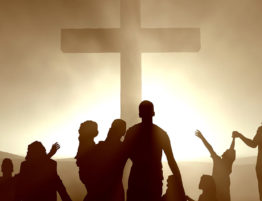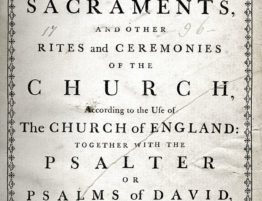
Text: Revelation 7:2-15
Today is the Sunday in the Octave of All Saints, when we celebrate the Feast of All Saints. Those of you who attended our midweek discipleship or listened to the audio podcast of the class on Christianity and Halloween last month may recall that All Saints is one of the younger feast days in the Church. It was originally introduced in the 5th Century as a spring feast in Rome when a chapel at St. Peter’s Basilica was dedicated to Jesus, Mary, and the Holy Martyrs. By the turn of the 11th Century it had been moved to November 1 and had become a Feast for the entire Western Church. The main purpose of All Saints is to remember and celebrate the saints in heaven who don’t have their own special feast day, whether they’re known heroes of the faith or saints whose lives are known only to God Himself.
The word “saint” means “holy one” or “one who has been set apart.” In the Scriptures, the word “saint” doesn’t only apply to the Church Triumphant in heaven. It doesn’t only, or even especially, apply to the heroes of the faith who have gone before us and are held up as examples for us to emulate. In the Scriptures, the term refers to all of God’s people: past, present, and future. So, there is a sense where we both aspire to become saints and are already saints by virtue of Christ’s blood. This is one of those “already-and-not-yet” aspects of the Christian faith, similar to how the Kingdom of God is already here with Christ’s first coming but is also anticipated in its fullness with his second coming. It is similar to how we have been saved, are being saved, and will be saved if we are in Christ. By virtue of the promises God has made to you in your baptism, the promises that you cling to by faith, you have the down payment of your future perfected sainthood to the point where you can with certainty be called a saint now.
Our Collect for All Saints Day (page 256 in your Prayer Book) sums this up in one of the most eloquent prayers in our Liturgy. We pray:
O Almighty God, who hast knit together thine elect in one communion and fellowship, in the mystical body of thy Son Christ our Lord; Grant us grace so to follow thy blessed Saints in all virtuous and godly living, that we may come to those unspeakable joys which thou has prepared for those who unfeignedly love thee; though the same thy Son Jesus Christ our Lord. Amen.
There is a single communion and fellowship of all of God’s elect. Election is one of those theological concepts that is often misunderstood. It simply means that God chooses all who are brought into his family. No one comes to faith because they’re smarter, more pious, or better than their unbelieving neighbor. No, we only come because God brought us in. Our faith is itself a gift from God.
Sometimes this leads people to think that it implies something unfair or arbitrary about God’s grace. The truth is, he knows his plan, and we don’t. If God were to be totally fair, no one would be adopted into his Kingdom. All of us are guilty of damnable sin. All have broken God’s holy law again and again and again. None of us would choose God without him creating in us a desire for him. In our corrupted humanity, we all love ourselves and our sin much more than God. But God, in his mercy and wisdom has chosen for himself a remnant that we call “God’s elect.”
Sometimes this leads people to fear, wondering if they have indeed been chosen. Well, the very fact that you’d worry about it is proof that you belong to God! Those who are not elect don’t worry about it! That’s why Article XVII says:
Election in Christ is full of sweet, pleasant, and unspeakable comfort to godly persons, and such as feel in themselves the working of the Spirit of Christ, mortifying [that is, killing] the works of the flesh, and their earthly members, and drawing up their mind to high and heavenly things.
In other words, when we remember who we are in Christ, that we are saints who are destined to be with Him in Glory, chosen by the Father to be co-heirs with Jesus, adopted into His family, this helps us to resist the World, the Flesh, and the Devil; causes us to think of God, and kindles up our love for him. As St. John saith “We love him, because he first loved us” (1 Jn 4:19).
Not only does this make us saints, but it also gives us fellowship with the Saints in heaven. There is one communion and fellowship, in Christ’s mystical body. And that fellowship crosses time, space, race, and even denomination. The tragic and frankly sinful divisions in the Church are temporal, but not eternal or ontological. Just like Israel and Judah in the Old Testament remained God’s people and heirs of Abraham despite their political division, so too is that the case for all those who are united by faith and baptism to our Lord Jesus, even if we are sadly not all in institutional communion with each other right now.
Our “For the Epistle” passage from Revelation paints the big picture quite well. Revelation 7:2 (also on page 256 in the Prayer Book):
Then I saw another angel ascending from the rising of the sun, with the seal of the living God, and he called with a loud voice to the four angels who had been given power to harm the earth and sea, saying, “Do not harm the earth or the sea or the trees, until we have sealed the servants of our God on their foreheads.” And I heard the number of the sealed, 144,000, sealed from every tribe of the sons of Israel.
Skipping down to Verse 9:
After this I looked, and behold, a great multitude that no one could number, from every nation, from all tribes and peoples and languages, standing before the throne and before the Lamb, clothed in white robes, with palm branches in their hands, and crying out with a loud voice, “Salvation belongs to our God who sits on the throne, and to the Lamb!” And all the angels were standing around the throne and around the elders and the four living creatures, and they fell on their faces before the throne and worshiped God, saying, “Amen! Blessing and glory and wisdom and thanksgiving and honor and power and might be to our God forever and ever! Amen.”
The first part of this passage shows the 144,000 who were sealed and set apart for God, another picture of the concept of Election about which we just spoke. While some theologians see the 144,000 as specifically talking about Jewish Christians, others see it as a symbolic representation of the entire Church, Jew and Gentile alike, who have been grafted together into the Olive Tree of Israel.
Regardless of which interpretation is correct, the second part of our reading speaks of the great multitude who are before the throne, people from every tribe and tongue. St. John in this vision saw everyone from Abraham to David to his brother Apostles to you and me in that multitude, all who belong to Christ. It is amazing to think that one of those languages that he heard was English, a language that hadn’t yet been invented when he had the vision! Among that “every tribe” would be Americans, and even Texans, worshiping right alongside the Patriarchs and Church Fathers! The curse of Babel was reversed, not by making us all speak Hebrew or Greek or Latin when we’re in the Heavenly Temple, but by sanctifying every language for God’s glory.
In Verse 13 we see what it’s like to be a saint before God’s throne:
Then one of the elders addressed me, saying, “Who are these, clothed in white robes, and from where have they come?” I said to him, “Sir, you know.” And he said to me, “These are the ones coming out of the great tribulation. They have washed their robes and made them white in the blood of the Lamb. “Therefore they are before the throne of God and serve him day and night in his temple; and he who sits on the throne will shelter them with his presence. They shall hunger no more, neither thirst anymore; the sun shall not strike them, nor any scorching heat. For the Lamb in the midst of the throne will be their shepherd, and he will guide them to springs of living water, and God will wipe away every tear from their eyes.”
The fact that this multitude is without number suggests that the “great tribulation” it speaks of is not some time of terror described in the Left Behind books, but is the very fight that we all must go through in this world. While we’re on this side of eternity we will always be set upon by the World, the Flesh, and the Devil. We will constantly be at war with those enemies. This is why we’re traditionally called the Church Militant, the Church at War. It’s not a war against flesh and blood, but is rather a war against sin and the Author of Sin. But when we’re in heaven, the fight is over, and we’re victorious. We’ve passed from being the Church Militant to being the Church Triumphant.
This can only be accomplished by being washed in the blood of the Lamb. Just as the Israelites had to have the Lamb’s blood on their doorposts to have the Angel of Death pass over them at the first Passover in Exodus, so too must we be washed in Christ’s blood if we’re to be numbered among the Saints. No one becomes a saint by his or her own special effort. No, those heroic and saintly deeds come by virtue of being washed in Christ’s blood. We remember this each time we partake of the Paschal (that is, Passover) Feast in Holy Communion. This is why we pray in our Anglican Liturgy:
Grant us therefore, gracious Lord, so to eat the flesh of thy dear Son Jesus Christ, and to drink his blood, that our sinful bodies may be made clean by his body, and our souls washed through his most precious blood, and that we may evermore dwell in him, and he in us. Amen.
Our Revelation passage goes on to describe what it means to be among the Saints: serving in God’s temple, sheltered by God’s presence. No more hunger, thirst, scorching heat, blistering sun, or tears. The Lamb of God is our shepherd protecting and nourishing us. The Lord himself is the light in heaven, sustaining rather than burning. In short, we’re free from our worldly cares.
In the Homily Against the Fear of Death, written by an anonymous English Reformer in the 16th Century, we’re told of three reasons why the world fears death: fear of losing the world’s treasures, fear of suffering, and fear of hell. For the Christian who is united to Christ, these are not issues. We know that our inheritance in Christ is better than anything that the world can offer. We know that any earthly suffering will ultimately yield to the joys of heaven, and we know that Christ has redeemed us from hell. This is what it means to be among the saints.
But in our Collect we also prayed for God’s grace so that we may follow the “blessed Saints in all virtuous and godly living.” This is why we do indeed look to the Saints in heaven, especially those heroes of the faith, as examples. Chances are, one of them has been through whatever you have been through. If you’ve ever struggled with lust, read St. Augustine’s Confessions. If you’ve ever despaired over a lost child or loved one, remember his mother St. Monica who prayed 30 years for her son’s salvation. If you’ve ever had to battle your inner Pharisee, read St. Paul. The list could go on and on. None of them were perfect. All of them were sinners like you and me. But they all were faithful to the end.
One of the best things about the narrative portions of Scripture is that it doesn’t sugarcoat the lives of the characters. We see St. Thomas’ doubt. We see Jeremiah’s depression. We see St. Paul and St. Barnabas go through a church split. But in the end, God always turns things around for his glory.
When we know that we have been baptized into Christ and thus have sainthood as our inheritance, it helps us to live more like saints here and now. Not because we get special brownie points before God, but because that’s who we really are deep down. That’s the other glorious thing about the saints in heaven: they no longer have sin. They are human in the way we were always meant to be. Our humanity is corrupted, theirs is perfected. As Christians, that’s who we are deep down also.
So, when we read the Beatitudes from today’s Gospel, or we recite the 10 Commandments, as we did earlier, or Father Isaac once again reminds us of the “bounden duty” passage in the Catechism (to follow Christ, to worship God every Sunday in his Church; and to work and pray and give for the spread of the kingdom), we don’t come to these “law” passages like a toddler who has been told it’s bedtime. No, we realize the goodness of these things. We realize that they help us live up to who we really are. We acknowledge that our Flesh, the World, and the Devil himself are against us when we live up to the calling. But we know that Christ has bought us, and enabled us by his Spirit to live as his saints, following the example of the Saints who have gone before us, making us
[V]ery members incorporate into the mystical body of [our Lord Jesus Christ], which is the blessed company of all faithful people; and are also heirs through hope of [God’s] everlasting kingdom, by the merits of his most precious death and passion … world without end. Amen.
In the Name of the Father, and of the Son, and of the Holy Ghost. Amen.




